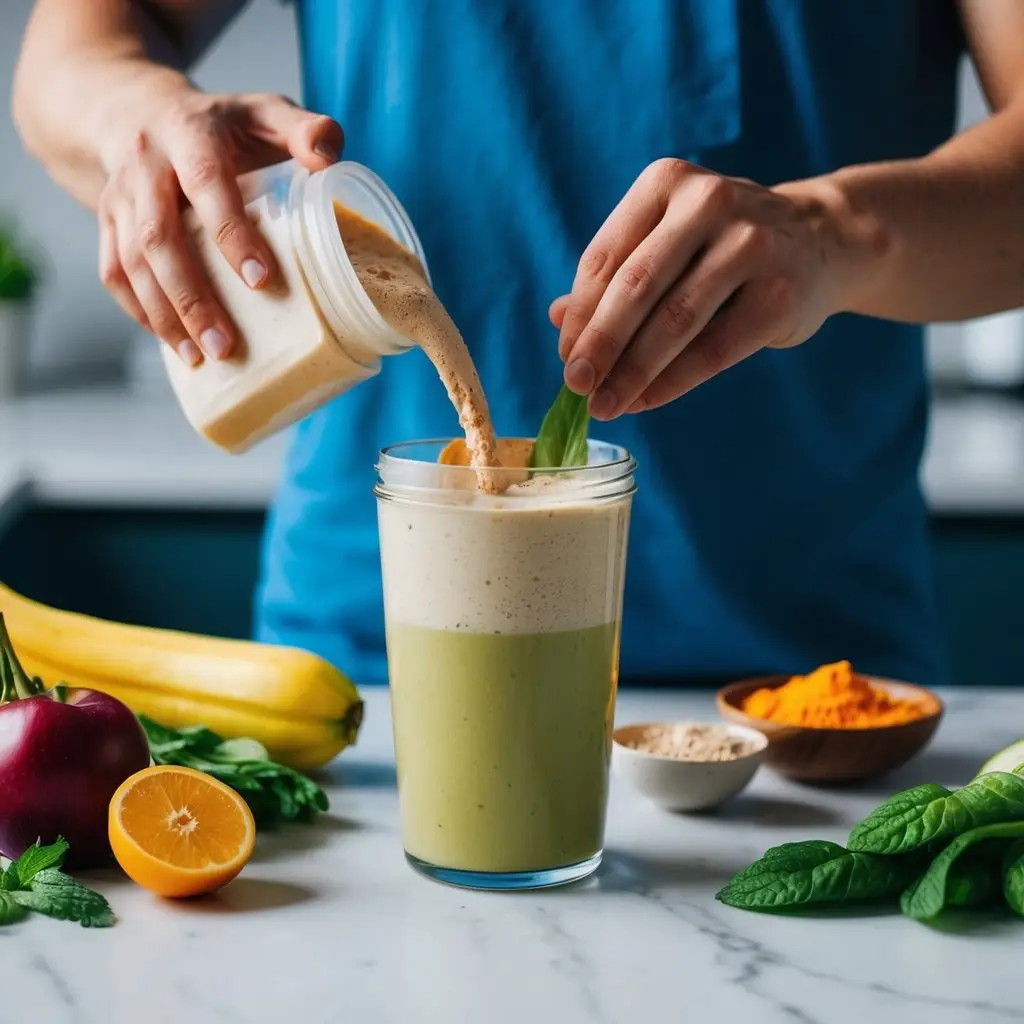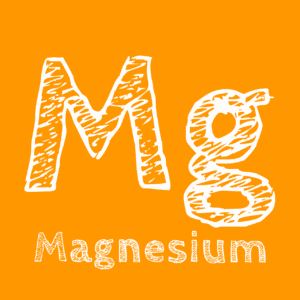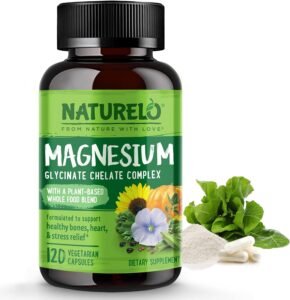Vegan protein powder is a popular choice for many people looking to boost their protein intake without using animal products. It’s made from plants like peas, rice, and soy. Vegan protein powder can be good for your health when used as part of a balanced diet.
These powders often have extra nutrients like fiber, vitamins, and minerals. They can help you meet your protein needs, which is important for building muscle and keeping your body strong. Vegan protein powders are also easy for most people to digest and don’t have lactose, which some folks can’t handle.
When you choose a vegan protein powder, look for one that has all the essential amino acids your body needs. Some plant proteins are “complete,” meaning they have all these amino acids. Others might mix different plant sources to make sure you get everything you need.
Key Takeaways
- Vegan protein powder can support muscle growth and overall health
- Plant-based proteins often include extra nutrients like fiber and vitamins
- Choose a vegan protein powder with a complete amino acid profile for best results
Benefits of Vegan Protein Powder
Vegan protein powder offers many health perks. It helps build muscle, gives your body important nutrients, and fits well into a balanced diet.
Aiding Muscle Growth and Recovery
Vegan protein powder can boost your muscle growth and help you recover after workouts. It has all the essential amino acids your body needs to build and fix muscle tissue. Many vegan powders have high levels of BCAAs (branched-chain amino acids), which are key for muscle growth.
These powders often mix well with water or plant milk. This makes them easy to drink right after exercise when your muscles need protein most. The fast-absorbing nature of protein powder helps start the muscle recovery process quickly.
Some vegan proteins, like pea protein, have been shown to work just as well as whey for building muscle strength and size.
Providing Essential Nutrients
Vegan protein powders pack more than just protein. They often contain vitamins and minerals that are good for your health. Many are rich in iron, which helps carry oxygen in your blood. Some have added vitamin B12, which can be hard to get from plants alone.
You might find calcium and magnesium in these powders too. These minerals are vital for strong bones and proper muscle function. Some vegan protein powders also offer fiber, which aids digestion and helps you feel full.
The nutrient mix in vegan protein can vary based on its source. Pea protein is high in iron, while hemp protein gives you omega-3 fatty acids.
Supporting a Balanced Diet
Adding vegan protein powder to your meals can help you meet your daily protein needs. This is especially useful if you don’t eat meat or dairy. It’s an easy way to boost the protein in smoothies, oatmeal, or baked goods.
Vegan protein powders are often easier to digest than dairy-based ones. This means less bloating and stomach discomfort for many people. They’re also good for those with milk allergies or lactose intolerance.
These powders can help you control your weight too. Protein keeps you feeling full, which may reduce snacking and overeating. Many vegan protein powders are low in calories but high in nutrients, making them a smart choice for a healthy diet.
Comparing Plant-Based Proteins

Plant-based protein powders offer different options to fit your needs. Each type has its own mix of nutrients and benefits.
Pea Protein Versus Rice Protein
Pea protein comes from yellow peas. It’s rich in essential amino acids and easy to digest. Pea protein has a smooth texture and mixes well in shakes.
Rice protein is made from brown rice. It’s gentle on the stomach and rarely causes allergies. Rice protein has less of some amino acids than pea protein.
Many brands mix pea and rice proteins. This combo gives you a full set of amino acids. It’s close to the protein quality of animal sources.
Hemp Protein and Other Sources
Hemp protein comes from hemp seeds. It’s full of healthy fats and fiber. Hemp has all nine essential amino acids your body needs.
Hemp protein has a nutty taste. It might not mix as smoothly as pea or rice protein. But it’s great for adding to baked goods or oatmeal.
Other plant protein sources include soy, pumpkin seed, and sunflower seed. Each has unique benefits. Soy is a complete protein like hemp. Pumpkin and sunflower proteins are good for people with allergies.
Digestive Health and Food Sensitivities

Vegan protein powders can be good for your gut health and helpful if you have food sensitivities. They often have less ingredients that may upset your stomach.
Impact on Irritable Bowel Syndrome and FODMAPs
If you have irritable bowel syndrome (IBS), some vegan protein powders may be easier on your gut. Look for low FODMAP options. FODMAPs are types of carbs that can cause digestive issues for some people.
Pea protein is often low in FODMAPs. It’s a common base for vegan protein powders. Rice protein is another choice that may work well if you have IBS.
Some brands make protein powders just for sensitive stomachs. These often have fewer ingredients and avoid common triggers.
Choosing Lactose-Free and Gluten-Free Options
Vegan protein powders are naturally lactose-free. This is good if you’re lactose intolerant or trying to avoid dairy.
Many are also gluten-free, but always check the label to be sure. Some may be made in facilities that process wheat.
Look for powders that are certified gluten-free if you have celiac disease or gluten sensitivity. Soy-free options are also available if you need to avoid soy.
Fiber content can vary in vegan protein powders. Some have added fiber, which may help your digestion. But too much fiber can cause issues for some people.
Safety and Quality Standards
Vegan protein powders need careful checks to make sure they’re safe and high-quality. Certain tests and labels can help you know if a product meets good standards.
Understanding Third-Party Testing
Third-party testing means an outside company checks the protein powder. This helps make sure what’s on the label matches what’s in the product. Some key things they test for are:
• Amount of protein • Heavy metals • Banned substances
These tests help keep you safe. They also make sure you’re getting what you pay for. Look for products that say “third-party tested” on the label.
Certifications and Labeling
Special labels can tell you more about a vegan protein powder’s quality. Here are some to look for:
• NSF Certified for Sport: Checks for over 270 banned substances • Informed Sport Certified: Tests every batch for banned drugs • Certified Organic: Made without synthetic pesticides or GMOs
The nutrition label is also key. It tells you what’s in the powder and how much. Check it to see protein amounts and added sugars. These labels help you pick the best product for your needs.
Incorporating Vegan Protein Powder into Your Diet
Vegan protein powder offers a versatile way to boost your protein intake. It can be used in many recipes and fits easily into various eating plans.
Creative Ways to Use Protein Powders
Mix vegan protein powder into your morning smoothie for a filling breakfast. Add a scoop to oatmeal or plant-based yogurt to increase the protein content. You can also bake with it – try adding it to pancake batter or muffin recipes.
Make protein balls by mixing the powder with nut butter and oats. These make great on-the-go snacks. For a quick protein shake, blend the powder with your favorite plant milk and fruit.
Try stirring protein powder into soup or sauce for an extra nutrient boost. You can even use it to make savory dishes like veggie burgers or falafel.
Meeting Dietary Needs and Goals
Vegan protein powder can help you meet your daily protein needs, especially if you’re very active. It’s useful for weight loss plans, as protein helps you feel full longer.
For muscle building, consume protein powder after workouts. Spread your intake throughout the day for best results. Choose a powder that fits your calorie and nutrient goals.
If you have specific dietary needs, read labels carefully. Some powders contain added vitamins and minerals. This can be helpful if you’re worried about nutrient deficiencies on a vegan diet.
Remember, protein powder is a supplement. It shouldn’t replace whole foods in your diet. Use it to complement a balanced eating plan rich in fruits, vegetables, and whole grains.
Frequently Asked Questions
Vegan protein powder raises some common questions about its effectiveness, benefits, and potential drawbacks. Let’s address some key concerns to help you make an informed choice.
What are the disadvantages of plant-based protein powder?
Plant-based protein powders may have a grittier texture than whey. They can also be more expensive. Some types lack certain amino acids found in animal proteins.
Can plant-based protein powder support muscle building effectively?
Yes, plant-based protein powders can help build muscle. They contain all essential amino acids needed for muscle growth. Pea and soy proteins are especially good choices for this purpose.
What are the benefits of opting for vegan protein powder over whey?
Vegan protein powders are easier to digest for many people. They’re free from dairy allergens. These powders often contain more fiber and nutrients than whey.
Are there any side effects associated with consuming protein powders?
Some people may experience bloating or gas when starting protein powders. Drinking plenty of water can help. It’s rare, but allergic reactions can occur with certain plant proteins.
Can excessive consumption of plant-based protein have negative health effects?
Too much protein can stress your kidneys if you have existing kidney issues. It may also cause weight gain if you consume more calories than you burn. Stick to recommended serving sizes.
How does the body process and absorb vegan protein powders?
Your body breaks down plant proteins into amino acids during digestion. These amino acids are then absorbed in your small intestine. The process is similar to how animal proteins are processed.




